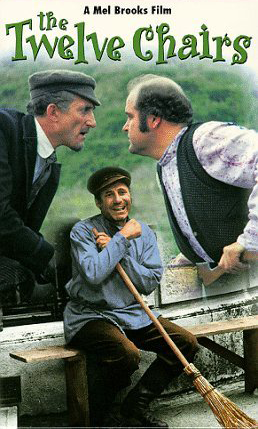
THE TWELVE CHAIRS
US, 1971, 96 minutes, Colour.
Ron Moody, Frank Langella, Dom De Luise.
Directed by Mel Brooks.
The Twelve Chairs is a comparatively little advertised Mel Brooks comedy. Brooks became famous with The Producers (1969), and achieved great success with Blazing Saddles, Young Frankenstein and Silent Movie in the mid-70's. This is the least known of his films, but it captures the mood of post revolutionary Russia while satirising it. It is a fable about mans greed and the lengths to which he will go. Ron Moody made this film soon after his great success as Fagin in Oliver. Dom De Luise appeared in several of Brooks later films, especially Silent Movie.
1. Was this just a Ron Moody or Mel Brooks comedy? funny?
2. Could the film be properly seen as a fable of human folly and of Russia? How? If so, was it successful?
3. How important was the Russian setting to the film - just a locale or an integral part of the story and atmosphere? Why?
4. What kind of man was the hero? What kind of pre-revolution style of living did he represent? How had the revolution affected him ,or better or worse? Had it changed him inside? Why did he become obsessed with finding the chairs? How pathetic was his obsession? Why?
5. How satirical was his giving everything to obtain the jewels?
6. What kind of man was the young man? Had the revolution affected him at all? What did he represent? Why did he join the search for the chairs? What was his relationship with the hero? How satirical was the search and chase for the chairs, the nature of the encounter with people and the lengths gone to in getting the chairs?
7. What comments on human foibles were offered? What comments on human greed? Comment on the theatre episode on the ship, its point and the way it was comically communicated. Also the couple with the chairs, their giving them away.
8. What kind of man was the monk? How had the revolution changed him? How funny was he? How pathetic, greedy, hypocritical?
9. What was the point of the return to where the chairs were and the irony of what the money was used for?
10. How pathetic and humiliating was the epileptic technique at the end? Where had the hero arrived?
11. How is all this a fable of the decline of the aristocracy and the exposure of social and religious hypocrisy?